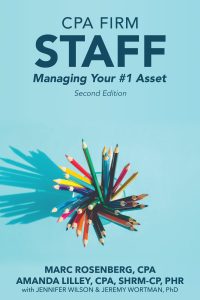Responding to Staff Who Decline Being Partner Because of the Long Hours Worked
![]() Marc Rosenberg, CPA
Marc Rosenberg, CPA![]() Kristen Rampe, CPA / Jul 5, 2022
Kristen Rampe, CPA / Jul 5, 2022
We were conducting a workshop for staff on the business of public accounting, how firms make money, why they should care that the firm is profitable, how the firm is managed and, lastly, why CPA firm partners have a great job. This workshop, which we commonly convene for firms, was for the professional staff of a $12M firm.
During our workshop, we explained to the staff why it’s great to be a CPA firm partner.
Partners…
- have the freedom and flexibility of a business owner
- do work that is high-level, challenging and interesting
- function as entrepreneurs
- have the prestige of being a partner in a reputable firm
- work with long-time clients who love them, and they love back
- have staff to delegate work to
- mentor young people
- have tenure, just like professors (often effectively true, though never guaranteed)
- have little accountability (pardon the sarcasm)
- get a sizable buyout when they retire
- make great money, way more than they ever thought
On the last point, we always go through an exercise with the staff. We ask them what they think the partners of a typical local CPA firm (not necessarily their own firm) earn. The responses typically range from $150,000 to $350,000, with an average of about $250,000 – including responses from firms located in large metro areas with nationally high earning rates. The latest Rosenberg MAP Survey shows this to be $521,000. In other words, the staff have almost no idea how much money partners actually earn.
It’s at this moment we ask the seminal question: “Now that we’ve told you why it’s great to be a partner, how many of you want to be a partner?” Surprisingly, almost shockingly, under 50 percent of the staff raise their hands. We then ask “Why you don’t want to be a partner?” The sobering response is “We see all the hours that partners work, and we don’t want to work like that.”
Our book CPA Firm Staff: Managing Your #1 Asset offers practical advice on ► talent management ► recruitment & retention ► flexibility ► importance of the boss ► mentoring ► leadership development ► performance feedback
Many of you have experienced the same response from your staff. Instead of shaking your head and lamenting that “today’s young people just don’t want to work,” here are some suggestions for how to respond:
- Look at the actual hours worked – for partners, as well as experienced staff. Often times, staff think the partners work “all the time” when, in fact, they don’t. Staff average 2,250 hours per year (remember, this includes vacation, holiday and sick time), and partners average 2,450. That’s 170 overtime hours for staff, most of which is worked during the tax season. For partners, it’s 370 overtime hours, two-thirds of which is worked in the tax season and the remainder throughout the year. With flexible scheduling (staff decide their work hours, what days they work and where they work), these overtime hours can be worked in ways that fit like a glove with a person’s personal activities. Obviously, if your partners are workaholics, you’ve got a problem.
- Hours worked by successful executives. Bring to the staff’s attention that a successful executive-level person in any organization rarely works 9 to 5. Partners, just as any successful person in any field, work more than 2,080 hours per year. It’s that career commitment to getting the extra things done, strategically and when the need arises, that sets them apart from someone who is just working a job.
- Impact of hours worked on compensation. Point out that when one amasses more total work hours than their peers, this usually has minimal or no impact on their compensation. The exceptions will be if the extra hours result in more new business brought in or substantially more billable hours. Stress that staff as well as partners are compensated mostly on how they perform, what they produce and meeting or exceeding expectations – not hours worked.
- Family and social demands change as one gets older. People 45 or younger (roughly) generally have more demands on their personal time than partners do. Staff in their twenties often have a very active social life, which makes working long hours problematic. Staff may have family obligations, especially if they have children who are, say, 14 or younger. Contrast this with partners, most of whom are 45 or older. Their children are often adults, thus reducing demands on their time. So when staff see partners working “all the time,” a big reason for this is that they are at a different stage of their life than young staff. They have fewer demands on their time for personal reasons. This partially explains why partners work more hours than staff. In the vast majority of firms, partners do not get paid more solely for working more total hours than their fellow partners; they must produce and contribute more overall to earn the higher compensation.
- Partners have more responsibilities than staff do. Another reason why partners seem to work longer hours is that, as they progress within the firm, they often have more and higher-level job responsibilities. Examples are socializing with clients, prospects and referral sources; managing and nurturing a million-dollar-plus client base; billing; attending partner meetings; and, to a smaller extent, official internal admin duties (which most firms frown upon because admin work should be performed by the firm’s COO and other admin staff).
- There are new paths to success. Many firms are determining how to successfully bring in partners who work a reduced schedule. With the talent shortage comes a reduced ability for experienced partners to retire and have sufficient successors to take over their work and pay their buyouts. Progressive firms are considering just what the hours requirements are for new partners, and where flexibility may be advantageous. While part-time or reduced schedule partners may not be the norm, excluding them from any possibility of partnership may shrink your chances of perpetuating your firm. If not already considering this, your firm may want to do so.
So, when staff tell partners that they don’t want to be a partner because of all the hours that a partner works, you now are armed with some good responses.
1 Comments

CPA Firm Staff: Managing Your #1 Asset, Second Edition
New Second Edition! In an era of tight labor supply and high turnover, the old ways of managing staff no longer work. Today’s firms need to address retention, staff engagement, recruiting, training, mentoring, recognition, leadership development, advancement, performance feedback and work-life balance; here’s your complete guide.
Learn More
I think what you are observing is a process of “self elimination” by those staff. They don’t see themselves as capable of being partners, or don’t want to make the overall commitment, so they use the excuse of “too many hours” to remove themselves from consideration of that career path. It has always been a relatively small number of CPA’s who actually want to be partners, and I don’t think we can change that by dressing up work/life balance in shiny new terminology. I’m not a workaholic, and I keep my work hours at a reasonable level, but it does take courage, commitment, and HARD WORK to face the challenges and responsibility of running a business while at the same time serving clients.